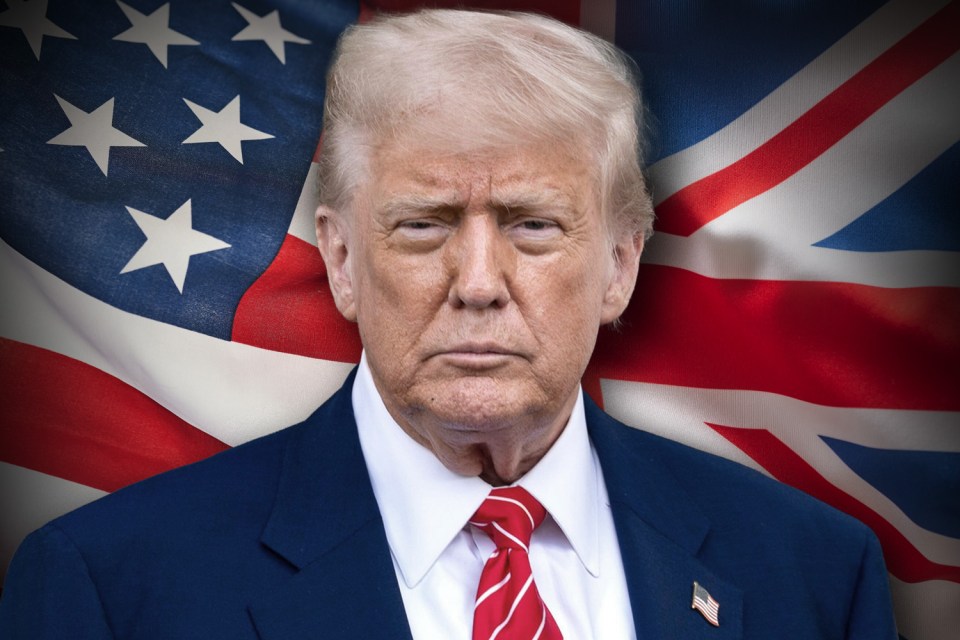THE Prime Minister dashed to Jaguar Land Rover in Solihull yesterday to show car makers they were winners in the UK-US deal.
But most businesses still believe they are in a worse situation than before President Donald Trump’s tariff blitz.
Bosses privately complained last night that despite being the first nation to strike a deal, the UK is still stuck with a 10 per cent baseline tariff.
Institute of Directors adviser Emma Rowland said while the deal “shields some of our key export sectors from the worst excesses of US protectionism . . . it falls short of the full free trade agreement ministers have been seeking for years”.
The FTSE 100 yesterday dipped by 27.72 points — 0.32 per cent — to 8,531.61.
The terms of the historic deal mean British car makers will have their tariffs knocked back from 27.5 per cent to 10 per cent for the first 100,000 of vehicles sent across the Atlantic — close to the exact amount of annual exports.
READ MORE ON US-UK TRADE DEAL
JLR ships around a quarter of its vehicles to the US every year and was facing millions in extra export costs that threatened the factory’s livelihood.
JLR boss Adrian Mardell said: “The car industry is vital to the UK’s prosperity, sustaining 250,000 jobs. We warmly welcome this deal.”
Luxury car brand Aston Martin saw its shares jump by 14 per cent yesterday.
Other winners include British Steel with 25 per cent tariffs on steel and aluminium imports dropped. Brewers will also benefit.
And Rolls-Royce is a big winner after Mr Trump reduced a tariff to 10 per cent on the aircraft maker’s engines and some parts.
But farmers will be angry over ethanol imports and more machinery, chemicals and beef, although food standards will remain.
AIR CHAOS CLUE
A FIRE that caused the Heathrow Airport shutdown has been traced to a 60-year-old electricity substation.
A report by the National Energy System Operator into the chaos on March 20 confirmed the blaze started at the North Hyde substation, which had been built in the 1960s.
It then spread to two other National Grid facilities, which took out the power from Europe’s busiest airport.
The report said the cause remained unknown but police had found no evidence to suggest it was suspicious.
NEXT BASKS IN SUN
FASHION powerhouse Next has boosted its profit forecasts for the second time in two months after spring sunshine sent shoppers flocking to the high street.
The chain said sales had jumped by 11.4 per cent in the 13 weeks to April 26, helped by the “warmer weather” which had caused a surge in demand for spring and summer wardrobes, as modelled by telly’s Rochelle Humes.
After making £55million more in sales than expected over the past three months, Next bumped up its profit forecasts by £14million to £1.08billion.
One insider said the profit upgrade did not reflect any benefit from shoppers switching to Next during Marks & Spencer’s cyber attack because the 13-week period had been before M&S stopped taking online orders.
M&S shares tumbled during the incident – with the retailer shedding more than 12 per cent of its value, or £1.05billion, since the hack at Easter.
The CO-OP and Harrods were also subject to recent cyber attacks which crippled online systems.
Next is likely to benefit from M&S shoppers who are impatient to order new outfits switching loyalty as the cyber attack issues drag on.
TSB’S ON A ROLL
HIGH street bank TSB has posted a doubling in profits thanks to cost-cutting and new mortgage business.
First-quarter profits at the lender — owned by Spanish bank Sabadell — rose from £53.4million a year ago to £101.3million.
And its mortgage lending jumped by 12 per cent year-on-year to £1.5billion from January to the end of March.
The bank said: “The UK consumer remains resilient in the face of sluggish economic growth and uncertainty about the global outlook.”
CENTRICA PAY FUELS REVOLT
THE owner of British Gas faced a shareholder revolt yesterday as nearly 40 per cent of investors voted against pay packages for its top brass.
Centrica’s Chris O’Shea was paid £4.3million last year, roughly half the £8.4million he earned the year before.
Mr O’Shea has previously said there was “no point” in trying to justify his multimillion pay package — and he has come under fire as households face rising energy bills.
At Centrica’s annual investor meeting in Manchester, two in five shareholders voted against its remuneration report, which sets the pay for top directors.
Shareholder advisory group ISS had recommended investors vote against Mr O’Shea’s pay packet.
The meeting came alongside British Gas saying profits will be lower because a warm spring had lessened demand for heating.
TESCO boss Ken Murphy has seen his pay dip to £9.23million from £10.2million last year.
In 2024, his pay doubled from £4.4million as share awards vested.
The head of Britain’s biggest retailer received a 3 per cent rise in his base salary to £1.45million.
ELECTRIC VANS FLAT
TRADERS are snubbing electric vans amid fears of high prices and charging anxiety, Autotrader data shows.
The online marketplace says despite van makers offering discounts, drivers are reluctant to commit.
Used electric vans take 12 days longer to sell, with many nervous about a lack of charging points.
Tom Roberts, of Autotrader, said: “There’s a confidence crisis among tradespeople in going electric.”
